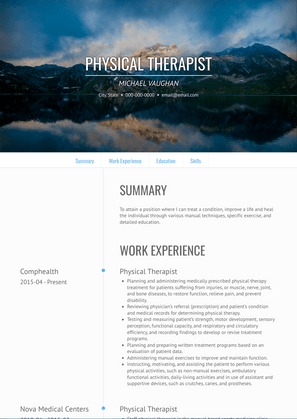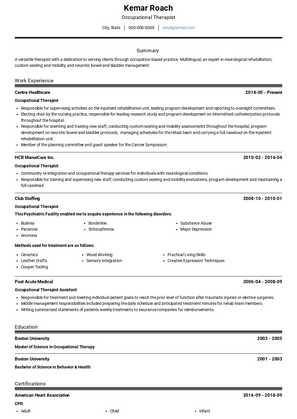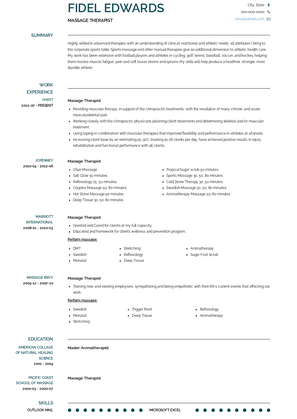Therapist Resume Samples
This page provides you with Therapist resume samples to use to create your own resume with our easy-to-use resume builder. Below you'll find our how-to section that will guide you through each section of a Therapist resume.



Overview
A therapist is a broad name given to the variety of professionals who provide treatment and rehabilitation for people with physical or cognitive issues. The industry is expected to grow by 16% by 2030. To gain employment in this growing field, you'll need an excellent therapist resume.
To help you write the best Therapist resume you can, this article will show you:
- Therapist resume examples
- Therapist resume sample summary sections
- How to list your Therapist resume skills section
- How to write your Therapist resume work experience and education section
What is a Therapist?
A therapist — also commonly called a counselor — is a mental health professional. They work with patients to help solve various issues related to psychological or physical health.
Therapists are employed in lots of different settings, such as private practices, offices, hospitals, or clinics or facilities. They work with clients one-on-one or in groups. Sessions can take place in-person or online and deal with problems like addiction, depression, trauma, or marriage problems.
Therapist Resume
Jacqueline Kelley Summary Seasoned, dedicated therapist with 10+ years of clinical experience providing patients with effective treatment programs. Proficient with assessing patient condition, keeping detailed records of progress, and suggesting practical solutions. Committed to encouraging and reinforcing positive behaviors and feelings while developing behavioral and emotional goals via collaboration with clients. Experience Therapist, Arizona Therapist Associates | July 2017 - Present
- Provided psychotherapy services to hundreds of patients in private practice settings, addressing a wide range of issues and concerns.
- Carried out in-depth clinical assessments and reports on new patients.
- Created and devised effective treatment plans for clients, establishing goals with the help of clients
- Provided ongoing client education and recommended materials and activities to help clients reach their rehabilitation goals.
- Treated clients with food and drug addiction, providing support and strategies to help them find solutions to their concerns
Therapist, Allen Goodman Therapy | October 2013 - July 2017
- Carried out assessments for new clients via interview
- Developed treatment plans using effective theories and practices
- Worked with clients with severe mental health disabilities, providing them with resources and rehabilitation techniques they could use at-home
- Managed a high caseload that included day and evening sessions, including occasional home calls
- Worked with other staff members to encourage a productive and healing environment
Education Doctor of Clinical Psychology, University of Arizona 2008 - 2012 BA in Psychology, University of Arizona 2004 - 2008 Skills
- Addiction Counseling
- Marriage & Family Counseling
- Excellent Communication Skills
- Intake Interviews
- Intervention Planning
- Communications Theory
- Person-centered Therapy
- Patience
Why it works: This Therapist resume is great because it’s well-structured. The candidate has significant experience, education, and skills, but this resume manages to present the information in an easy-to-read way.
Mental Health Therapist Resume
Joe Lowery Summary Dedicated Mental Health Therapist with 5+ years experience serving adults, adolescents, and families. Expert at working with individuals with substance abuse, serious mental illness, and traumatic brain injuries. Proficient at assessing client needs and developing client-directed treatment plans in accordance with primary care directives. Great communicator and team player, adept at developing relationships with community support and resource agencies. Experience Mental Health Therapist, MHT Group | April 2017 - Present
- Assessed patients for risk of suicide and self-harm
- Maintained detailed, confidential records relating to client treatment and progress
- Encouraged clients to discuss the issues and problems affecting their lives, helping them to develop understanding and insights into their behaviors and relationships.
- Collected information on clients via interviews, tests, and observations
- Developed personalized treatment plans based on client input, alongside personal experience and knowledge
- Counselled patients in group and one-to-one sessions to help overcome dependencies, make positive changes, or overcome trauma
Education Master of Social Work, Humboldt State University 2015 - 2017 BA in Psychology, Claremont McKenna College 2011 - 2015 Skills
- Treatment Planning
- Crisis Intervention
- DMH Paperwork
- Case Management
- Individual and Group Therapy
- Art Therapy
- Client Assessment
- Applied Behavioral Science
- Bilingual (Spanish)
Why it works: This mental health therapist resume is effective because it features a comprehensive resume summary and a great work experience section. The candidate has a wealth of experience that they have crystallized down into their work experience section. Additionally, they use the skills section to highlight characteristics that make them a unique candidate, including a second language, which will come in useful in certain regions.
Counselor Mental Health Therapist Resume
Jason Washington Summary Insightful and experienced counselor with an excellent grounding in mental health and substance abuse protocols. Proficient in dealing with emergency situations with a calm and compassionate approach. Passionate about patient support and resource advocacy, with a flair for developing strong relationships with patients, communities, and mental health services. Experience Counselor, Vale Green Rehab | August 2017 - Present
- Used cognitive behavioral therapy to help patients understand and address destructive habits and behaviors
- Performed 1 group therapy and 5 one-on-one sessions daily
- Managed caseloads, including intakes and crisis management, and prevention
- Completed documentation efficiently, including treatment plans, reviews, ASAM certification forms, weekly summaries, and all discharge documents
- Led emergency crisis counseling, encouraging behavior management systems while adhering to regulations and code of ethics.
Counselor, Oregon Health Centers | June 2013 - August 2017
- Connected clients with community service and resource agencies
- Assessed clinical risk to families and children, making recommendations about intervention and appropriate responses
- Assessed patient behaviors to determine diagnosis and appropriate treatment plans
- Provided educational and family counseling services
- Helped patients to understand and deal with mental health issues, recommending effective coping skills
Education MSc. in Counselling, University of Oregon 2011 - 2013 BA in Psychology, University of Chicago 2007 - 2011 Skills
- Group therapy
- Family support
- Communication skills
- Knowledge of psychotropic medicines
- Cognitive behavior therapy
- Clinical documentation
- Interpersonal skills
Why it works: This Counselor resume does a good job of communicating who this candidate is and the type of work they do. While some therapists are primarily office-based, others work closely with community services and advocate for resource support. Depending on the aims of each organization, specific candidates will be a better fit.
How to Write a Therapist Resume
A Therapist Resume needs to be a concise document that communicates your education, work experience, therapeutic approach, and skills.
Your resume should contain these five sections:
-
A header that details your name, address, and contact details.
-
A snappy resume summary that highlights your experience, achievements, and accomplishments in a short paragraph.
-
A work experience section that lists your past and current work in the therapy field.
-
An education section that lists your relevant qualifications.
-
A skills section that demonstrates the hard and soft skills you bring to the job.
Writing the Perfect Therapist Resume Summary (with Examples)
A great Therapist Resume summary will succinctly communicate who you are, your work experience, and which areas you specialize in.
Resume summaries use active verbs and compress a lot of information into a short paragraph. The perfect resume summary will be conscious of the job post requirements and will look to connect what the hiring manager is looking for with the candidate’s past experience.
Therapist Resume Example - Summary
Licensed, Masters Level Therapist with 3+ years experience working with victims of abuse. Compassionate, understanding, and supportive, with a strong ability to build trust and relationships with clients. Experience in devising treatment plans and recommending resources and materials to help clients overcome difficulties and develop robust coping skills.
A good resume summary will give hiring managers a good idea about the therapist and their approach. This example is good because it makes up for a relative lack of experience by including license and educational background.
Mental Health Therapist Resume Example - Summary
Client-focused Mental Health Therapist with 10+ years experience delivering the highest quality service and support. Self-starter with an excellent work ethic and a desire to achieve the best outcomes for both patients and the clinic. Extensive administrative experience in both Clinical and Primary care settings.
This Mental Health Therapist resume example is good because it demonstrates the candidate’s experience, work ethic, and attitude towards their patients. Additionally, it highlights their administrative experience, which is important, depending on the job requirements.
Related: Our guide on how to write a resume summary.
How to List Your Therapist Experience on Resume (with Examples)
The work experience section is one of the most critical parts of a Therapist Resume. Hiring managers will want to see what past experience you have and learn more about your approach.
Your Therapist Resume work experience section should include:
- Your job title.
- Company or organization.
- Job location.
- Dates of employment.
- At minimum 4-6 bullet point sentences that describe your responsibilities.
Many organizations use Applicant Tracking Systems (ATS) to sort through all the resumes they receive. These automated tools search for defined keywords to identify suitable candidates.
Ensure that you read the job post and pick out words and phrases that describe what the employer is looking for. These can relate to education, therapeutic approaches, skills, or other duties. When you’re writing your work experience section, incorporate these keywords and phrases where possible to give yourself a better chance of passing the ATS screening process.
Sample Therapist Resume Work Experience
Therapist, ABC Recovery | Jun 2015 - March 2022
- Provided intensive individual therapy for adolescents and adults in a facility setting
- Diagnosed and identified mental health conditions using DSM-5; developed effective treatment plans based on diagnosis and experience.
- Coordinated and managed treatment services for at-risk populations, working with local authorities and courts to provide recommendations and insights.
- Used various therapeutic interventions, such as psychodynamic, person-centered, DBT, trauma-informed, and CBT.
- Documented client information to detail treatment and progress
- Collaborated with co-workers to ensure the facility produces an environment that gives clients the best chances of success.
Why it works: This Therapist resume work experience section works because the candidates squeeze in a lot of information about their skills and achievements. Additionally, it lists the therapeutic interventions they have worked with, which is useful when applying for different positions.
Mental Health Therapist Resume - Work Experience
Mental Health Therapist, Grand Rapids Services | July 2020 - Present
- Performed assessment of child and adult mental health; working with families to understand the concerns and behaviors
- Developed treatment plans to meet patient requirements, adopting a collaborative approach that included client goals
- Coordinated with schools, courts, and other professionals manage patient care services and requirements
- Presented clinical cases in weekly and monthly meetings
- Assisted in registration, discharge, and billing
- Handled patient appointment setting, observing and recording patient progress
Why it works: This Mental Health Therapist work experience section is good because it demonstrates the candidate’s skills as a therapist and their ability to manage admin, reporting, and liaising with schools, courts, and other bodies.
Therapist Experience Resume Example
Therapist
- Provide individual therapy using strengths based, person centered approach
- Rapidly transitioned entire caseload to telehealth at onset of pandemic
- Collaborate with clients to develop therapeutic goals and objectives
- Exhibit creativity and adaptability with clients and team members
- Provide holistic care using team based approach in an integrated care setting
- Identify risk factors and effectively assess crisis situations
- Utilize collaborative documentation to maintain timely clinical records
- Attend professional development trainings / courses / workshops
- Maintain cultural competence by participating in monthly supervision
Therapist Experience Resume Example
Therapist
- Maintained and updated patient records, service plans and assessments
- Tracked progress according to goals for interventions
- Promoted cooperative team atmosphere and positive working environment
- Provided individual and group therapy to diverse clients ages 6 and up
- Guided clients in development of skills using solution focused brief therapy
How to List Therapy Skills on Resume
A therapist resume skills section is shorter than a work section. It's a good place to list your core competencies in an easy-to-read fashion.
You should include a mix of hard and soft skills that make you a great therapist. Pay special attention to unique or special skills that set you apart from other candidates.
Finally, before you add your skills, read the job description. If the post is calling out for specific attributes or characteristics, ensure that you include them in your therapist resume skills section. The ATS or hiring manager will likely be scanning for some of these characteristics.
Top Therapy Resume Skills for 2022
- Cognitive Behavioral Therapy (CBT)
- Mental Health Diagnosis
- Crisis Intervention
- Case Management
- Addiction Recovery
- Dual Diagnosis
- Group Therapy
- Person-centered Therapy
- Clinical Documentation
- Empathy
- Interpersonal Communication
- Psychotropic Medications Knowledge
- Intake Interviewing
- Conflict Resolution
- Applied Behavioral Science
- Learning Disability Awareness
- Community Referrals
- Treatment Planning
- Progress Assessment
- Psychotherapy
How to Become a Therapist
There are a few different paths that you can take to become a therapist. The primary reason for this is that there are several types of therapists, with some requiring different educational backgrounds.
Additionally, each state has its own requirements for different types of mental health professionals. The best course of action is to check your state's specific licensing requirements and go from there.
That said, there are many commonalities. For example, most states will require you have, at minimum, a bachelor's degree to become a therapist. However, most licensed therapists are required to hold a master's degree, while others hold advanced degrees like an MD, PsyD, or a Ph.D.
To gain a license that allows you to work directly with patients, you need these qualifications alongside clinical hours. Once these hours are completed, you need to take a certifying exam and purchase liability insurance.
What to Study to Become a Therapist
A degree is your first step towards becoming a therapist. Social science degrees like sociology or psychology are helpful. However, because most licensed therapist positions require a degree, it's not uncommon for graduates to come from other backgrounds, like political science.
From there, a master's degree in social work or clinical mental health, or related fields are required. Finally, certain specialist areas – like clinical psychology — require a doctorate degree.
Therapist Salaries
The average salary for a Mental Health Therapist in the US is about $48,000. Depending on experience, location, and the organization, this can rise to around $66,000.
Entry-level Therapists can expect to make an average of around $44,000, while those with more experience can expect somewhere between $50,000 to $55,000.
Final Thoughts
A strong Therapist's resume needs to show a mix of technical and interpersonal skills. These positions are very demanding and require dealing with vulnerable people going through difficult times. As such, suitable candidates need a variety of hard and soft skills.
Most therapists need a master's degree, so make sure you provide a detailed education section. Additionally, your work experience section is important for showing hiring managers that you have mastered the requirements for the job.
And remember, always include a solid resume summary that outlines your experience, skills, and accomplishments. This section is the first thing a hiring manager will read, so get it right by personalizing it to the job.
Good luck!
Copyright ©2025 Workstory Inc.
